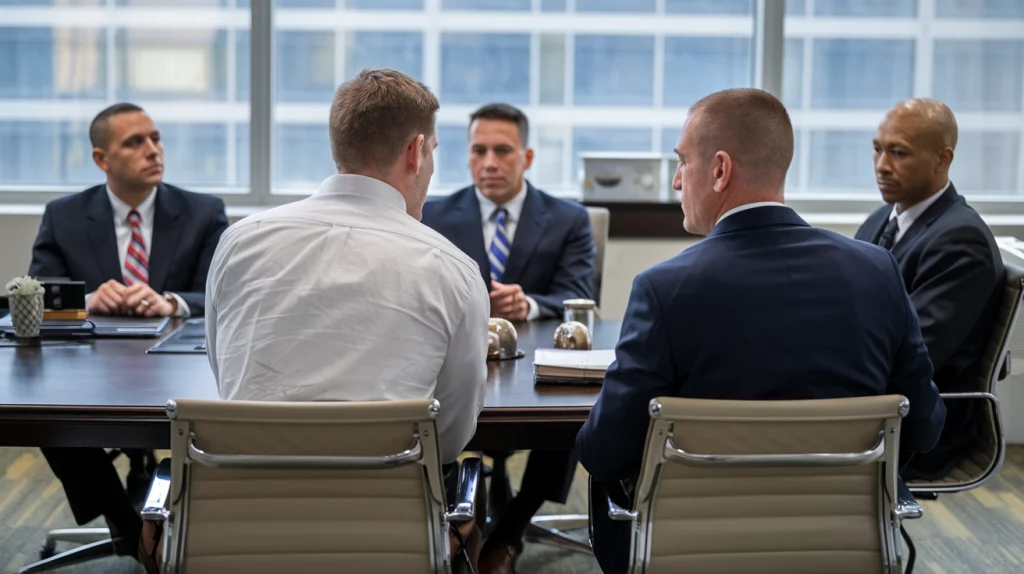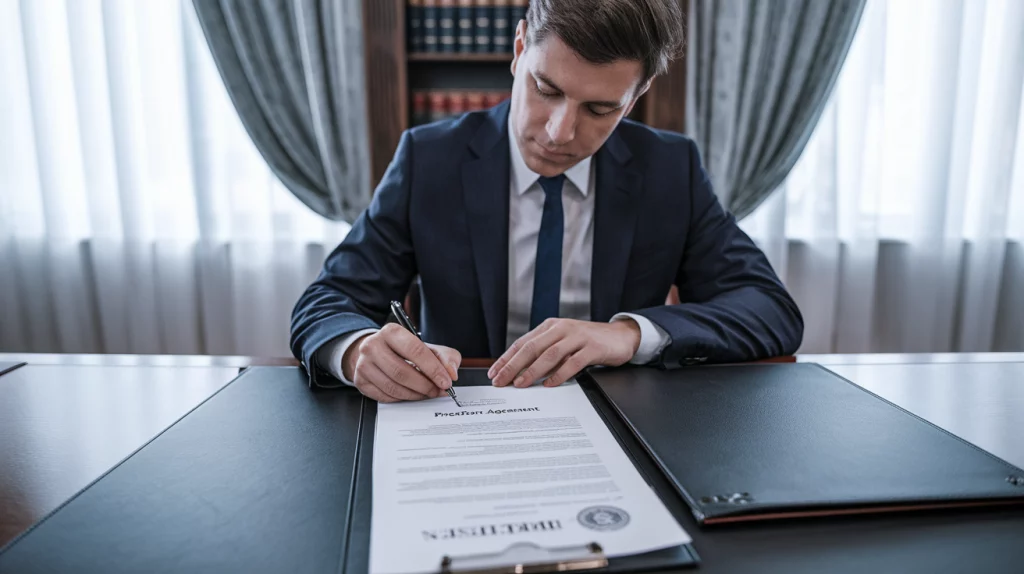How does a proffer work, and how should I handle it?
A “proffer” is a meeting between a suspect or “target of an investigation,” their lawyer, state or federal law enforcement, and a prosecutor or an Assistant United States Attorney.

What is the purpose of a proffer meeting?
A proffer meeting is where a suspect or person accused of a crime meets with law enforcement and provides information about the crime, the people involved, and their involvement in the offense. The purpose of a proffer is to avoid criminal charges, get charges dismissed, or get charges or the potential punishment reduced. A proffer can have a significant impact on the course of a prosecution. Sometimes, a proffer may convince the government to forgo charges altogether. Proffer meetings with law enforcement happen most frequently in federal cases but also from time to time in state cases. Generally, the participants in a proffer meeting include the suspect, also known as the “target” or defendant, their criminal defense lawyers, one or more law enforcement officers or agents, and the federal or state prosecutor.
Should I agree to a proffer meeting with law enforcement?
Whether you should agree to a proffer is an incredibly complex question. You and your lawyer will need to take significant time to discuss your case and the advantages and disadvantages of a proffer. There are plenty of ways a proffer can help you and numerous ways it might harm you. It takes decades of experience to acquire the expertise to help clients make the best choice. There is no “right” answer that fits every situation.

10 Tips for Making the Most of a Proffer with Federal Agents or Police Officers
How can I make the best impression if I participate in a proffer meeting? Here are 10 tips for making the most of a proffer meeting and causing yourself the least amount of damage.
- Tell the truth. While it may seem obvious, the starting point with any proffer session with the government is telling the truth, the whole truth, and nothing but the truth. Lying during a proffer session will destroy all the potential benefits of the meeting and could open the door to additional criminal charges. Your memory does not have to be perfect; you must make an honest effort to be truthful.
- Listen to the question and answer only the question asked. Many clients are anxious to “tell their side of the story” to persuade the government that they are good or innocent people. Unfortunately, a client’s eagerness to speak can result in the sharing of information that is not favorable or leads to new questions or suspicions. Failing to answer a question fully might make you seem evasive or dishonest.
- Make sure you understand a question and ask for clarification if needed. Offering an effective response to an investigator’s question requires a basic understanding of the question. If you do not understand a question and your answer is not on point, it can hurt more than help.
- Wait. Think to yourself, not out loud. Most clients are used to speaking in a conversational style. In proffer sessions, clients must slow down, think carefully, and articulate a thoughtful, accurate response to the question. Thinking out loud can lead to new lines of inquiry unnecessarily. Worse, a person thinking out loud may say something that law enforcement takes issue with, causing a problem.
- Answer the question and stop. Being chatty will not score any points in a proffer session. An effective response answers the specific question asked and nothing more. If a simple “yes” or “no” fully answers the question, there is no need to embellish it. You will want to provide thoughtful, truthful, and complete answers, nothing more.
- Do not use “always” or “never” unless you are confident they apply. Given the reality of everyday life, there is rarely a scenario where “always” or “never” is an accurate answer. While those words are common in everyday, casual conversation, they are rarely appropriate when you are in a proffer. It is critical to err on the side of caution and not use these terms unless you are 100% confident they apply. Inevitably, when a client says they have “never” done something, the prosecutor produces evidence showing the one instance when the client engaged in that specific behavior. After a proffer, the government does a post-proffer investigation, and “always” and “never” propositions are disfavored. It is, therefore, better to say “I usually,” “I don’t recall exactly how many,” or “I rarely” rather than use absolutes.
- Say “I don’t know” or “I don’t remember” if that is a truthful answer. Clients must understand that “I don’t know” or “I don’t remember” are satisfactory responses to a question if truthful. Under the stress of a government interview, it is common for clients to have difficulty remembering facts or events. In many investigations, the government will ask about events that transpired months or years earlier. It is essential that they feel comfortable saying that to the agent or prosecutor rather than guessing or making up an answer if the client cannot recall what happened or perhaps was not even involved in certain events.
- Unless told to do so, do not guess. If you do guess, make it clear that your answer is speculation. If a person guesses when answering questions, they are locked into the answer, unless they clarify that their answer is a guess or they are making an assumption. Incorrectly guessing during a proffer meeting with law enforcement could be detrimental to the client at a trial or any subsequent proceeding where someone might use their proffer statement for impeachment. If the client is going to guess or estimate, they need to clarify what they are doing.
- Do not turn the questioning into a conversation. Clients struggle to stay focused if they let the questioning turn into a conversation. The client must maintain the discipline to wait for a question, answer it, stop, and wait for the next question, even if there are periods of silence. Chit-chat, joking, and melodrama are detrimental. The client must remain attentive and straightforward because the prosecutor assesses their propensity for truthfulness.
- Ask to speak with your lawyer if you have any concerns about a question or topic. If a client is concerned about truthfully answering a question or how to answer a question, they should consult with their attorney privately before answering. Answering a vague or ambiguous question during a proffer meeting with law enforcement can be misunderstood. Similarly, if the client loses focus or gets tired, a break for a few minutes to talk with their lawyer can provide a much-needed breather. Before concluding a proffer session, it is also vital to confer outside the government’s presence to go over any areas of concern or confusion to clarify “the record” before officially concluding the session.

Frequently Asked Questions Regarding Proffer Meetings with Law Enforcement
What happens at a proffer session?
Generally, the prosecutor or Assistant United States Attorney, an officer or agent in charge (possibly more than one), the defense lawyer, and the suspect or defendant get together for a meeting. The meeting can occur at the prosecutor’s or defense lawyer’s office, a law enforcement facility, or anywhere mutually agreeable. The government agents will ask the defendant or suspect questions, request information, possibly review evidence, and more. There can be follow-up meetings or requests for additional information at the meeting’s conclusion.
What is the purpose of a proffer agreement?
The purpose of the proffer agreement is to allow the defendant to seek a reduction in charges or a more lenient sentence if they can provide substantial assistance to the government’s effort to catch and prosecute other people for crimes they committed. From the government’s perspective, it allows law enforcement to get truthful information that will help them investigate and prosecute other suspects.
What is proffer in criminal law?
In criminal law, a proffer is a meeting between the defense and the government. The defendant provides information they hope the government will consider favorable regarding plea and sentence negotiations.
What does proffer mean in law?
A “proffer in law” is the same as any other proffer. There is no difference.
What is a federal corporation?
Cooperation means:
- providing information for the government to use in the prosecution of other potential defendants,
- providing testimony at trial or a grand jury,
- acting as a government informant, and
- engaging in staged criminal activity (such as controlled buys) to help the government collect evidence and testifying as needed before a grand jury or at trial.
What does it mean to cooperate with the feds?
It means providing the government with assistance in investigating or prosecuting others, hoping that the prosecutor will view the cooperation favorably as it relates to plea negotiations and sentencing.
What is a 5K1 federal?
If a defendant provides “substantial assistance” to the government, the United States Attorney’s office will file a 5K1 motion with the sentencing court for a sentence below the applicable sentencing guidelines.
How do I prepare for a proffer?
Preparation for a proffer session is essential. Mistakes, lies, misunderstandings, and failures to provide needed information can be fatal to someone’s attempt to be treated favorably by the government. Most people are not familiar with or comfortable with law enforcement questioning. The defense lawyer and the client must thoroughly prepare for the proffer session to provide credible, truthful, and complete information.

To Proffer or Not to Proffer, that is the Million Dollar Question
Whether a client should present for a proffer is a critical question with lifelong consequences. The choice can make the difference between freedom and imprisonment. Also, there are collateral consequences of providing a proffer that your lawyer must weigh carefully to determine what course is in your best interest. The potential direct and collateral consequences of participating in a proffer meeting with law enforcement or becoming a confidential informant are significant.
The attorneys with LEWIS & DICKSTEIN, P.L.L.C. have decades of experience helping clients develop winning strategies for their defense. If a trial, a plea, or a proffer is best for you, we can help you make that decision. We will take the time to answer all your questions, address your concerns, and work with you to determine which option is in your best interest. We are intimately familiar with the advantages and disadvantages of participating in a proffer meeting, and we can help you make the best choice. Also, we take the time to work with our clients to ensure they are fully knowledgeable and prepared, regardless of the defense strategy. Call us for a free consultation to discuss your options. We will find a way to help you!
Call us today at (248) 263-6800 for a free consultation or complete an online Request for Assistance Form. We will contact you promptly and find a way to help you.














